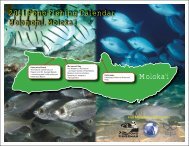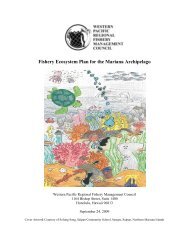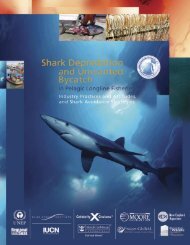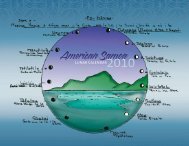Hawaii FEP - Western Pacific Fishery Council
Hawaii FEP - Western Pacific Fishery Council
Hawaii FEP - Western Pacific Fishery Council
Create successful ePaper yourself
Turn your PDF publications into a flip-book with our unique Google optimized e-Paper software.
size of the reef area surveyed, based on a number of studies reported by Dalzell (1996). Arias-Gonzales et al. (1994) have also examined this feature of reef fisheries yield estimates and notedthat this was a problem when comparing reef fishery yields. The study noted that estimatedyields are based on the investigator’s perception of the maximum depth at which true reef fishesoccur. Small pelagic fishes, such as scads, may make up large fractions of the inshore catch froma particular reef and lagoon system, and if included in the total catch can greatly inflate the yieldestimate. The great variation in reef yield summarized by authors such as Arias-Gonzales et al.(1994), Dalzell (1996), and Dalzell and Adams (1997) may also be due in part to the differentsize and trophic levels included in catches.Another important aspect of the yield question is the resilience of reefs to fishing, and recoverypotential when overfishing or high levels of fishing effort have been conducted on coral reefs.Evidence from a <strong>Pacific</strong> atoll where reefs are regularly fished by community fishing methods,such as leaf sweeps and spearfishing, indicates that depleted biomass levels may recover topreexploitation levels within one to two years. In the Philippines, abundances of several reeffishes have increased in small reserves within a few years of their establishment (Russ andAlcala 1994; White 1988), although recovery in numbers of fish is much faster than recovery ofbiomass, especially in larger species such as groupers. Other studies in the Caribbean andSoutheast Asia (Polunin and Roberts 1996) indicate that reef fish populations in relatively smallareas have the potential to recover rapidly from depletion in the absence of further fishing.Conversely, Birkeland (1997b) cited the example of a pinnacle reef off Guam fished down over aperiod of six months in 1967 that has still not recovered 30 years later.Estimating the recovery from, and reversibility of, fishing effects over large reef areas appearsmore difficult to determine. Where growth overfishing predominates, recovery following effortreduction may be rapid if the fish in question are fast growing, as in the case of goatfish (Garciaand Demetropolous 1986). However, recovery may be slower if biomass reduction is due torecruitment overfishing because it takes time to rebuild adult spawning biomasses and highfecundities (Polunin and Morton 1992). Furthermore, many coral reef species have limiteddistributions; they may be confined to a single island or a cluster of proximate islands.Widespread heavy fishing could cause global extinctions of some such species, particularly ifthere is also associated habitat damage.CrustaceansCrustaceans are harvested on small scales throughout the inhabited islands of the <strong>Western</strong> <strong>Pacific</strong>Region. The most common harvests include lobster species of the taxonomic groups Palinuridae(spiny lobsters) and Scyllaridae (slipper lobsters). Adult spiny lobsters are typically found onrocky substrate in well-protected areas, in crevices, and under rocks. Unlike many other speciesof Panulirus, the juveniles and adults of P. marginatus are not found in separate habitat apartfrom one another (MacDonald and Stimson 1980; Parrish and Polovina 1994). Juvenile P.marginatus recruit directly to adult habitat; they do not utilize separate shallow-water nurseryhabitat apart from the adults as do many Palinurid lobsters (MacDonald and Stimson 1980;Parrish and Polovina 1994). Juvenile and adult P. marginatus do utilize shelter differently fromone another (MacDonald and Stimson 1980). Similarly, juvenile and adult P. penicillatus alsoshare the same habitat (Pitcher 1993).64












